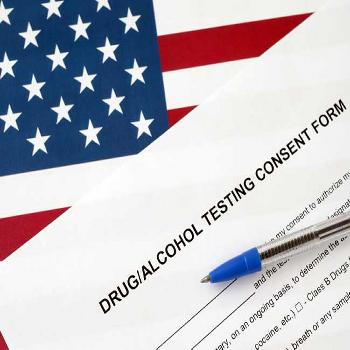DOT 5 Panel Drug Screen (Federal/Regulated) (Urine):
- Compliance: Meets the drug testing requirements established by the DOT for employees in safety-sensitive positions.
- Substances Tested: The urine test screens for the following substances:
- Marijuana (THC)
- Cocaine (COC)
- Opiates (including heroin)
- Amphetamines (including methamphetamines)
- Phencyclidine (PCP)
- Laboratory-Based: Conducted at a SAMHSA-certified laboratory, ensuring reliable and accurate results.
- Detection Window: Most drugs are typically detectable in urine for approximately three days after the last use or exposure. A confirmed positive result indicates use within this timeframe.
- Confirmation Testing: Includes necessary confirmation testing for any positive results.
DOT Physical Exam:
- Vision: Evaluates visual acuity, requiring drivers to see at least 20/40 in each eye, with peripheral vision of at least 70 degrees.
- Hearing: Assesses hearing capability, requiring the ability to hear a "forced whisper" at a distance of 5 feet or less, indicating less than 40 dB hearing loss in the better ear.
- Blood Pressure and Pulse Rate: Checks for high blood pressure and irregular heartbeat.
- Urinalysis: Analyzes urine samples to screen for signs of diseases such as diabetes.
- Physical Examination: A thorough assessment of overall physical health to determine the individual’s ability to perform safety-sensitive duties.
This combined package is essential for employers committed to maintaining a safe work environment and ensuring the health and fitness of their safety-sensitive employees.
Why would I need this test and exam?
The 5-Panel DOT Drug Screen + DOT Physical Exam is required for individuals performing safety-sensitive duties regulated by the U.S. Department of Transportation (DOT), such as commercial drivers, pilots, train operators, and other transportation professionals. This combination ensures:
Compliance with DOT regulations for drug-free and physically fit individuals in safety-sensitive roles.
Pre-employment screening to verify that candidates meet DOT medical and drug-free standards before starting their duties.
Regular or routine testing and physical exams for continued eligibility in safety-sensitive positions.
Post-accident evaluations or reasonable suspicion testing.
Return-to-duty or follow-up evaluations after violating DOT regulations or a prior positive test.
The combination of the drug screen and physical exam promotes safety in transportation and ensures compliance with federal standards.
What does the DOT Physical Exam evaluate?
The DOT Physical Exam assesses an individual’s overall health and physical ability to perform safety-sensitive duties. It includes:
Medical History Review: You will be asked to provide information about your medical history, medications, surgeries, and any existing health conditions.
Vital Signs Check: Blood pressure, pulse rate, and other vital signs are measured.
Vision and Hearing Test: Ensures you meet the minimum requirements for safe operation in your role.
Physical Examination: The examiner will check your heart, lungs, neurological function, spine, and extremities.
Urinalysis: Not for drug testing but to check for underlying medical conditions like diabetes or kidney issues.
This exam must be performed by a certified medical examiner who must obtain or maintain a DOT Medical Certificate, which is valid for up to 24 months unless additional monitoring is needed.
Will over-the-counter or prescription medications affect the drug screen or physical exam results?
Yes, some medications can affect both the drug screen and physical exam:
Drug Screen: Certain over-the-counter medications (e.g., decongestants containing pseudoephedrine) or prescription medications (e.g., opioids for pain) can trigger false positives. You must disclose any medications you take to the testing administrator for accurate interpretation.
Physical Exam: Some medications may affect your blood pressure, heart rate, or other vital signs. Be sure to inform the examiner about all medicines you take, including doses and reasons for use.
Always provide complete and accurate information to ensure the results are interpreted correctly.
How is the sample collected for the drug screen, and how is the physical exam conducted?
5-Panel DOT Drug Screen:
Using a sterile container, you will be directed to provide a urine sample in a private restroom.
The sample is then sent to a certified laboratory for analysis to test for the presence of the five drug classes.
DOT Physical Exam:
You will complete a medical history questionnaire and provide relevant documents.
The medical examiner will check your vision, hearing, heart, lungs, neurological function, and other physical aspects.
A simple urine test (not for drugs but to check for medical conditions) may be conducted.
You may be asked to perform specific physical maneuvers to assess mobility and strength.
